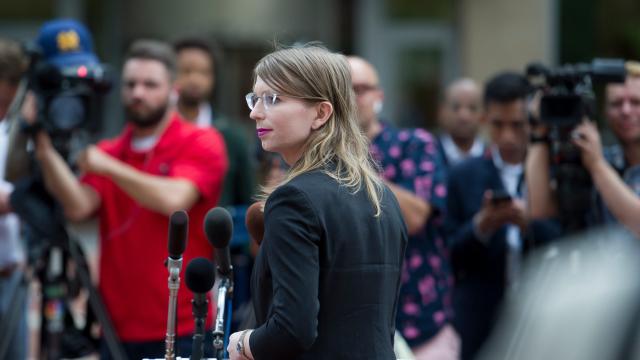Attorneys for Chelsea Manning have once again asked the court to release the activist and whistleblower from her confinement in Virginia, on the basis that she cannot be coerced to testify in the US Justice Department’s ongoing investigation into Wikileaks and its founder Julian Assange.
“She is suffering physically and psychologically, and is at the time of this writing in the process of losing her home as a result of her present confinement,” the lawyers said. “She has made clear she prefers to become homeless rather than betray her principles. Her intransigence, at this point, is not reasonably in question.”
US District Court Judge Anthony Trenga ordered Manning to be confined again this month after she was briefly released when the Wikileaks grand jury in the Eastern District of Virginia expired. Trenga also imposed a fine on Manning of $US500 ($723) per day, a penalty that’s set to kick in next month. The fine will jump to $US1000 ($1446) after 60 days.
In its motion, Manning’s legal team argued that there’s zero chance the former US Army intelligence analyst would change her mind and cooperate with the government. The fine and her imprisonment, therefore, are effectively a punishment, even though she has not been charged with a crime.
Specifically, the motion asks the court to “reconsider and appropriately modify the sanctions imposed upon her, such that the remaining sanctions, if any, do not exceed their lawful civil function as coercive, and not punitive sanctions”.
Her lawyers said the court may impose fines in order to coerce a recalcitrant witness’s compliance, but not to punish disobedience with a court order. Coercive fines, they said, are usually applied only to corporations, which cannot be gaoled.
[referenced url=”https://gizmodo.com.au/2019/05/fbi-sued-over-files-on-dead-hacker-who-turned-in-chelsea-manning/” thumb=”https://i.kinja-img.com/gawker-media/image/upload/t_ku-large/rncsogu3kmswrul3juxh.jpg” title=”FBI Sued Over Files On Dead Hacker Who Turned In Chelsea Manning” excerpt=”A researcher seeking access to the FBI’s files on Adrian Lamo — a deceased hacker best known for informing on whistleblower Chelsea Manning — filed a lawsuit this week citing the bureau’s failure to properly respond to her request.”]
Moreover, witnesses who are held in contempt typically are not both fined and imprisoned, the lawyers said.
There is no date set for when the judge will rule on Manning’s motion to reconsider sanctions.
It remains unclear why the grand jury in the Wikileaks case continues to exist. Assange has already been charged with conspiracy to commit a computer crime and, in a superseding indictment this month, with espionage against the United States.
“In 2019, the federal grand jury exists as a mockery of the institution that once stood against the whims of monarchs,” Manning wrote in a letter to Judge Trenga earlier this week. “It undermines the Fourth Amendment’s protections against unreasonable search and seizure, and the Fifth Amendment’s guarantees of due process. Today’s grand juries do not safeguard such fundamental rights, and they are easily subject to abuse.”
“The tradition of using political grand juries to jail political dissidents and activists is long,” she continued. “The concept of a grand jury in which prosecutors subpoena activists and jail them for refusing to comply with the subpoena stands in stark contrast to the institution contemplated in the Constitution.”
This month, Manning attorney Moira Meltzer-Cohen called the indictment of Assange “a real shift” in the US Justice Department’s interpretation of the Espionage Act, one that “sets a new precedent for the federal government’s desire to chill and even punish the vigorous exercise of the free press”.
The espionage charges themselves set a high evidentiary bar for federal prosecutors. They will need to prove in court that Assange did not publish the classified documents Manning leaked merely in the interest of transparency, but with the specific intent to do harm to the United States.
It won’t be easy. Wikileaks partnered with journalists at London’s Guardian newspaper and at The New York Times to publish the material, which alongside a slew of embarrassing cables written by US State Department envoys, included evidence tying the US military to war crimes in Iraq and Afghanistan.
Assange himself is the recipient of several journalism awards, including a Martha Gellhorn Prize for Journalism, for his work on the documents Manning leaked.
Assange was arrested this month and sentenced to 50 weeks in prison for fleeing to London’s Ecuadorian embassy while on bail in 2012. He is wanted for extradition by the United States, which will argue its case in a British court on June 12.
Earlier this week, Assange was transferred to a prison hospital citing unspecific health issues. “During the seven weeks in Belmarsh [prison] his health has continued to deteriorate and he has dramatically lost weight,” Wikileaks said in a statement. “The decision of the prison authorities to move him into the health ward speaks for itself.”
Swedish prosecutors are also attempting to extradite the Wikileaks founder as part of an inquiry into allegations of rape that first surfaced in 2010.
